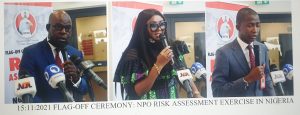On November 15, 2021, the colorful ceremony held at the Head Office Complex of the Economic and Financial Crimes Commission (EFCC) in Jabi, Abuja, attracted a mix of representatives from both local and international nonprofit organizations (NPOs), the media, key government parastatals such as the Nigeria Financial Intelligence Unit, Corporate Affairs Commission, Office of the National Security Adviser, and the Bornu State Government amongst other stakeholders.
Speaking on the importance of the risk assessment, Mr. Daniel Isei, Director of the Special Control Unit against Money Laundering remarked that the exercise was necessary following the outcome of a mutual evaluation exercise wherein Nigeria was rated non-compliant to the core requirements of the Financial Action Task Force’s (FATF’) requirements in relation to Recommendation 8. Although the Nigeria Financial Intelligence Unit had undertaken a comprehensive National Risk Assessment (NRA) of all sectors of the country’s economy in 2016, a peer review of the process otherwise known as a “Mutual Evaluation” conducted by FATF assessors in 2019 faulted the non-implementation of a standalone risk assessment of the nonprofit sector in the country. Specifically, the FATF R8 requires countries to implement a sectoral risk assessment of the terrorism financing threats and vulnerabilities likely to be present in its nonprofit sector. The process of a risk assessment is undertaken by adopting a risk-based approach that identifies the subset of nonprofit organisations likely to be at risk of terrorist financing abuse, assess and understand the risk factors and mediums. In addition, FATF R8 strongly cautions that measures enforced to limit risks do not disrupt the legitimate operations of nonprofits.
Also speaking at the event, SPACES FOR CHANGE’s Ms. Victoria Ibezim-Ohaeri, intimated participants on the timeline of events since the NRA was conducted in 2016. She noted that the fresh standalone risk assessment for NPOs draws life from sustained advocacy of civil society organisations in the country against the risk classification of NPOs in the country as vulnerable to TF and ML. A report published by SPACES FOR CHANGE in 2019 first provided the basis for disputing the results of the NRA as regards the nonprofit sector in Nigeria and, consequently gave impetus to civil society advocates such as the Action Group on Free Civic Space to engage relevant local and international authorities to consider a fresh assessment for the nonprofit sector in Nigeria.
In particular, the report noted that the Nigeria NRA besides not conducting a specific assessment of the nonprofit sector classified NPOs in the country as Designated NonFinancial Businesses and Professions (DNFBPs). The lumping of NPOs with disparate institutions operating under varying objectives and risk exposure levels influenced the imposition of blanket and burdensome AML/CFT compliance requirements for NPOs despite the lack of substantiated TF risks in the sector. Overall, the latest effort by national regulators to conduct a specific assessment for the nonprofit sector in Nigeria provides an invaluable opportunity for all stakeholders to actively work together to ensure an enabling environment for civil society in Nigeria.
The technical expert for the risk assessment exercise, Mr. Ben Evans, the team lead at Greenacre Associates also provided insights into FATF guidelines, methodologies, and best practices for conducting TF risk assessment for nonprofits. To ensure TF risk assessment of the nonprofit sector align with FATF standards, countries must demonstrate their comprehensive understanding of actual TF vulnerabilities and threats faced by nonprofits and develop proportionate regulatory measures and interventions to mitigate possible risks.
Both Chiara Crenna and Oluseyi Oyebisi, the Directors of International Non-Organisations (INGOs) and, Nigeria Network of NGOs (NNNGOs) commended national AML/CFT regulators for embarking on the important journey. They also expressed their willingness to work with national assessors towards the success of the NPO Risk assessment exercise.
Wrapping up the event, the EFCC Chairman, Abdulrasheed Bawa reiterated that the standalone risk assessment of NPOs in the country will not only ensure an improved FATF compliance rating for Nigeria but also enhance effective coordination and collaboration amongst all stakeholders to determine the vulnerabilities of at-risk nonprofits and ways to protect them.





















